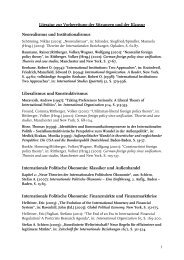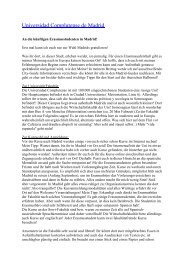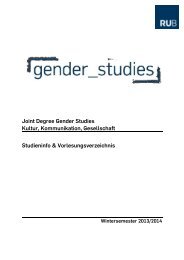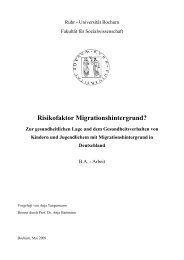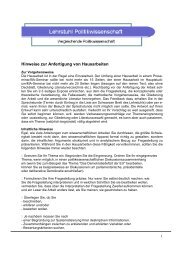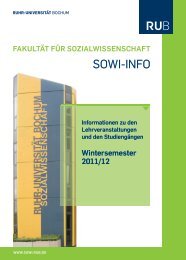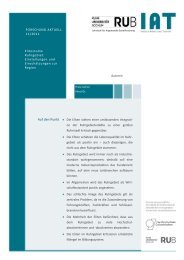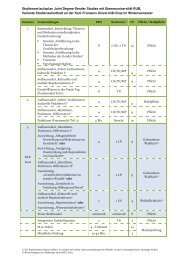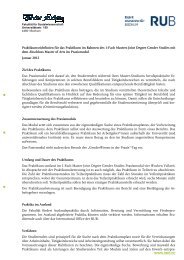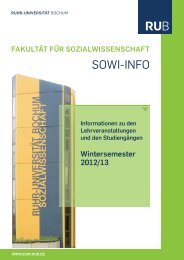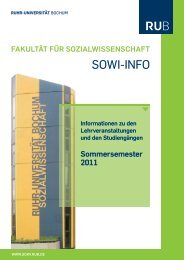View - Fakultät für Sozialwissenschaft der Ruhr-Universität Bochum
View - Fakultät für Sozialwissenschaft der Ruhr-Universität Bochum
View - Fakultät für Sozialwissenschaft der Ruhr-Universität Bochum
Create successful ePaper yourself
Turn your PDF publications into a flip-book with our unique Google optimized e-Paper software.
Wilkesmann/Rascher self-governance and slowness page 25<br />
dimension of autonomy. The dimension of cooperation is correlated positively with the<br />
dimensions of scope, autonomy, and task significance.<br />
Thus the second hypothesis can be confirmed for all dimensions of scope.<br />
In this case study it is not possible to confirm the third hypothesis, because only thirteen<br />
participants said that the social status was a selective incentive for them. The perception of<br />
usefulness does not correlate with intrinsically motivated cooperative actions. The perceived<br />
usefulness, however, is slightly negatively correlated with the controlling aspect of external<br />
interventions (p = -,225; significance ,000). Hence the third hypothesis has to be rejected for<br />
this case study.<br />
3.3 Summary of the empiric results<br />
The first hypothesis has been confirmed with slight reservations. There is a connection<br />
between the dimension of task significance and the emergence of intrinsic motivation during<br />
the work with the database. The second hypothesis has been confirmed for all the dimensions<br />
of scope. A large scope of action supports acting cooperatively in passing on data and,<br />
consequently, in sharing knowledge. These results are also interesting because the participants<br />
in this case study are people who have been socialised in a culture based on extrinsic<br />
incentives. Nevertheless, only a small number of interviewees said that they were motivated<br />
by extrinsic incentives alone.<br />
4. Negotiation processes to create structures that support self-governance<br />
The room for action and decisions described by the core dimensions does not come into<br />
existence by itself. It has to be created deliberately and thus it is a result of negotiation<br />
processes. In Germany, an important actor, who is part of these negotiation processes of work<br />
organisation by law, is the works council. Material results of these negotiation processes are<br />
company agreements. They regulate structures and procedures of certain problem areas.<br />
Knowledge management, however, was not a major part of the works councils' occupation.<br />
Many works councils still consi<strong>der</strong> the problems of the shop-floor workers as their priority.<br />
Nevertheless, there have been consi<strong>der</strong>able changes in recent times.<br />
In autumn 2002 we made a survey among German works councils in large enterprises in or<strong>der</strong><br />
to prove this theory by empiric results. 397 of 1465 works councils answered and 320 of the<br />
questionnaires could be used, which is an amount of 24,84 %. The focus lay on two problem<br />
areas:<br />
25



